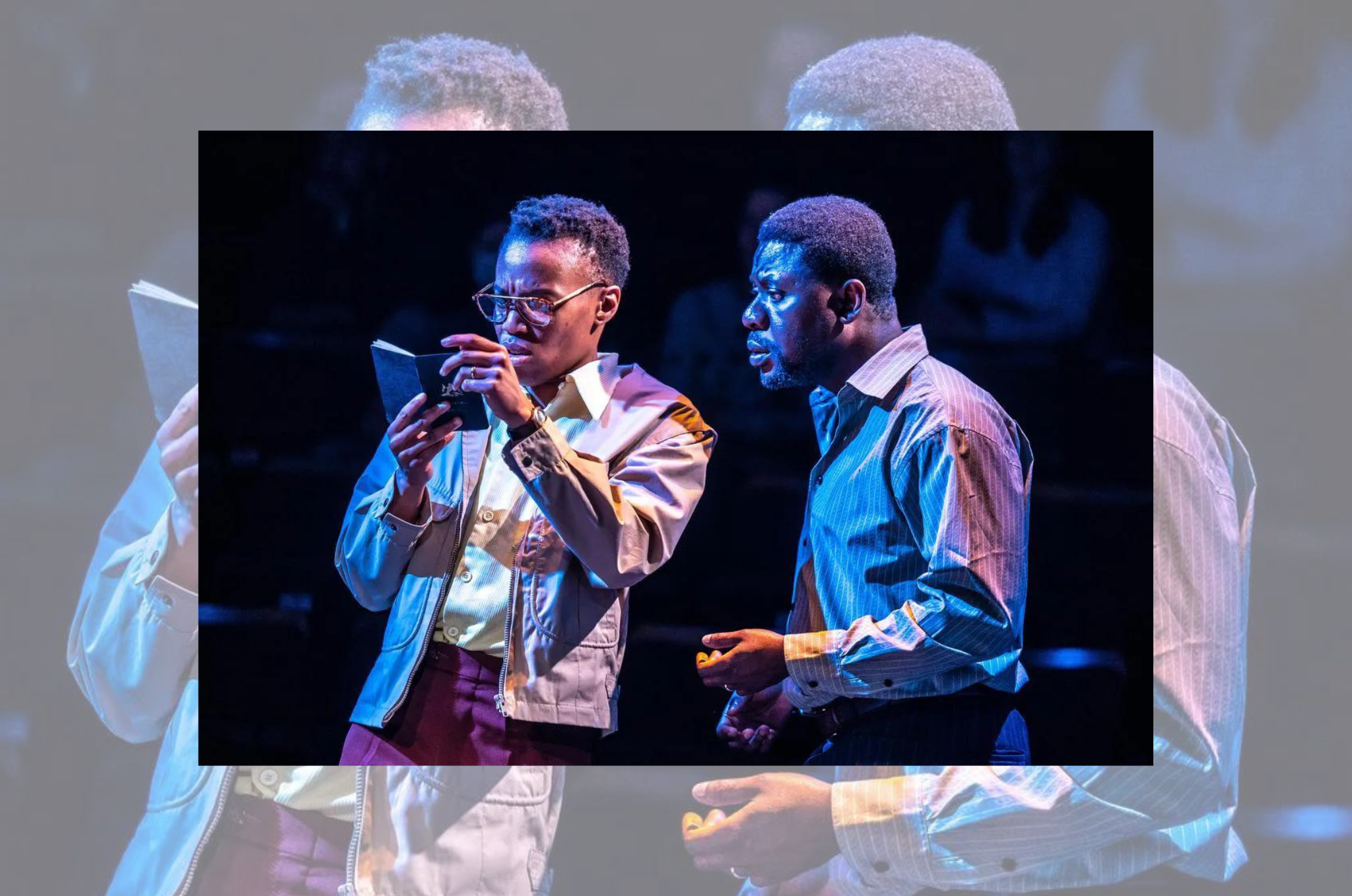REVIEW: Sizwe Banzi is Dead at Soulpepper
What’s in a name? And what would it take for you to erase your own?
In Soulpepper’s vital and poignant production of Athol Fugard, John Kani, and Winston Ntshona’s classic South African play Sizwe Banzi is Dead, identity can be a blessing or a curse. The curse came from the country’s rigid system of apartheid, in full effect when the play premiered in 1972. The racist class structure was particularly insidious in its issuing of identity books, which designated Black and other citizens of colour’s right to live and work in specific areas of the country; any issue with these documents became an easy excuse for punishment and jail time.
The one-act play blends two stories, the first serving as a framing device for the second. The first is that of a photographer named Styles (Amaka Umeh) who, sick of his job as the head “monkey” in charge of translation and communication between the white bosses and Black workers at the local Ford automobile factory, decides to forge his own path and become the driver of his own fate.
His particular delight in his chosen industry comes from his ability to not only keep to his own schedule, but to document the lives of people not often found in the spotlight. He “styles” himself (so to speak) as a visual voice for the oppressed class, making his life’s work the celebration of those whose lives rarely get but morally demand the quiet dignity that photographic preservation affords.
The second story is that of the titular Sizwe Banzi (Tawiah M’Carthy), one of the lives that begs to be documented. He is attempting to find work in Port Elizabeth; unfortunately, his passbook does not permit him to live or work there. After he meets with a friend’s contact, Buntu (also Umeh), the two men literally stumble across a solution to his problems, one that will present him with a serious moral quandary alongside the chance to change his life.
There are several reasons to see Soulpepper’s production. The first reason is the classic play’s script, which remains as relevant as ever. It blends vicious satire with an absurd, yet oddly realistic premise. Sizwe Banzi’s dilemma causes the viewer to question a system that was both very real and equally bizarre. A moment where Buntu details the byzantine list of steps within the governmental bureaucracy required to approve what is in essence a simple work visa is grimly resonant not just within its time and place (which is still depressingly recent), but to anyone who has had to deal with a program more concerned with policing than helping, or thinks about Canada’s treatment of Indigenous populations.
At the same time, it’s not just about the righteousness of an ostensibly illegal act against an unjust system; the choice for survival the titular character makes requires the obliteration of identity, and even the desecration of another human being worthy of dignity. It’s a rich dilemma that speaks to the characters’ understanding of the hopeless immutability of a larger societal situation beyond their ability to change.
In its use of social commentary, the script is also full of life, humour, and joy, celebrating the small victories that bring purpose to a life in oppressive times. Styles is playfully delighted to tell the audience his story, whether it involves the not-completely-accurate translations he conveys to his fellow employees from their hapless bosses, or his mission to eradicate his new studio from an army of cockroaches. His memories of a multigenerational family portrait that takes on more meaning for the family between the photos’ taking and their development due to the death of one of the family members will likely leave few dry eyes in the house.
The second reason to see this Sizwe is director Mumbi Tindyebwa Otu’s staging. The audience sits closely around the thrust stage, allowing us to focus on the action from various angles. In Sizwe Banzi’s chapter, the characters don’t break the fourth wall, but Styles’ monologue is delivered completely through it, allowing him to play the raconteur to all sides. Ken Mackenzie’s set has a pleasing green-corrugated aluminum roof with the name “STYLES” proudly printed on it, and a symbolically white-and-black checkerboard floor. There are curtains serving as the photographer’s backdrop that under Raha Javanfar’s lighting appear to go from the red of theatre curtains to a dusty yellow, one of a few moments that might make you question your perception of reality.
The third and perhaps most compelling reason to see this Sizwe is Amaka Umeh. In a blisteringly energetic performance, Umeh owns the stage as photographer Styles, holding court while speaking directly to the audience and telling us to “enjoy the vibes” on entry. Whether derisively reading the newspaper, performing a sort of bug spray ballet, or running around showing us the steps to deep-clean the Ford factory for a 30-second VIP visit, Umeh makes a long monologue stunningly captivating. As Buntu, they show a totally different physicality, languidly changing costumes to slip into the role of the more measured, pragmatic “fixer.”
Umeh is so vibrant that M’Carthy as Sizwe is in danger of becoming as lost in their presence as his character gets after a trip to a bar, but there’s also a magic in his initially quiet portrayal turning into self-aggrandizement and then bitter pain as he sees for the first time what respect and a life outside of rural poverty might look like, and roars with disappointment.
So, what’s in a name? Both Styles and Sizwe are “self-made men,” but in very different ways. One makes a name for himself, and one makes someone else’s name for himself, existing as a living ghost. As Sizwe strides forward and the photographer’s shutter preserves his smile, we see the transformative effect of what Styles has said is the most important thing in life, and what both men have only ever really wanted: “to stand straight in a place of your own.”
Sizwe Banzi is Dead runs at Soulpepper through June 18. Tickets are available here.
Intermission reviews are independent and unrelated to Intermission’s partnered content. Learn more about Intermission’s partnership model here.














Comments